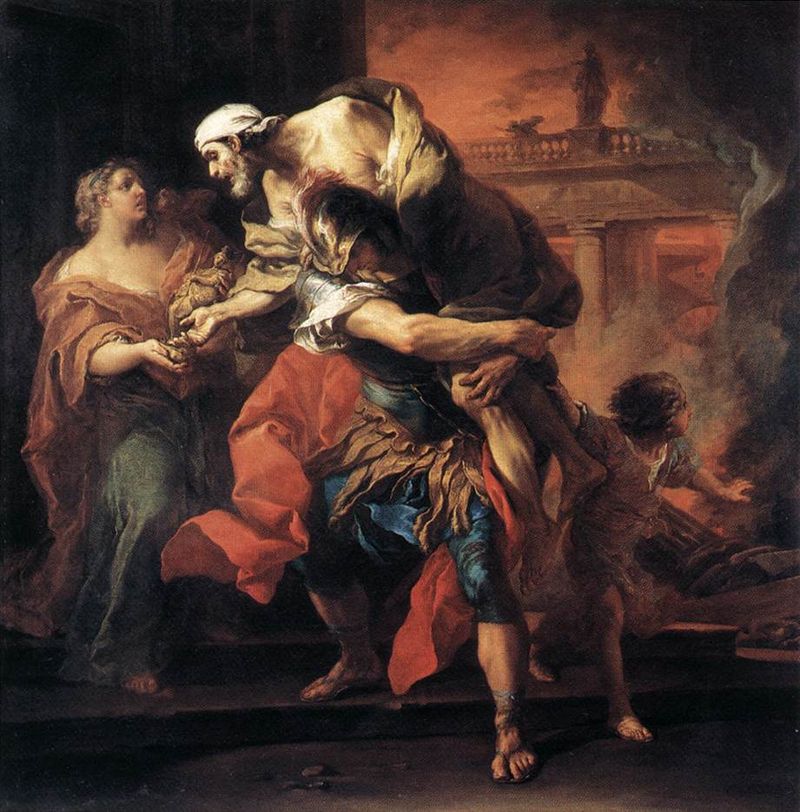We have posted about the strange story of Erikhthonios before, but this account not only contains an aetiological myth for the absence of crows but also has some strange details, like Athena trying to bring a mountain to Athens. Antigonus of Carystus allegedly compiled his collections of wonders in the 3rd Century BCE.
Antigonus Paradoxographus, Historiae Mirabiles 12
“Amelêsagoras the Athenian, author of the Atthis, claims that the crow does not fly to the Akropolis and that no one can say he has seen it happen. He provides the cause of this as a myth.
For he says that when Athena was given to Hephaestos that she disappeared right after she laid down with him and Hephaistos ejaculated his seed on the ground. The earth later produced for Hephaestos Erikhthonios whom Athena cared for but then closed in a basket and handed over to the daughters of Kekrops, Agraulos, Pandrosos, and Hersê. She told them not to open the basket until she returned.
When she left for Pellênê to bring back a mountain in order to make a defensive barrier before the city, two of Kekrops’ daughters—Agraulos and Pandrosos—opened the basket and saw two snakes around Erikhthonios.
[Amelêsagoras] claims that a crow went to Athena as she was carrying the mountain which is now called Lykabettos and told her that Erikhthonios was in the open. When she heard this, she threw the mountain to where it is now, said tat it would no longer right for the crow to go to the Akropolis because of his evil message.”
᾿Αμελησαγόρας δὲ ὁ ᾿Αθηναῖος, ὁ τὴν ᾿Ατθίδα συγγεγραφώς, οὔ φησι κορώνην προσίπτασθαι πρὸς τὴν ἀκρόπολιν, οὐδ’ ἔχοι ἂν εἰπεῖν ἑωρακὼς οὐδείς. ἀποδίδωσιν δὲ τὴναἰτίαν μυθικῶς. φησὶν γάρ, ῾Ηφαίστῳ δοθείσης τῆς ᾿Αθηνᾶς, συγκατακλιθεῖσαν αὐτὴν ἀφανισθῆναι, τὸν δὲ ῞Ηφαιστον εἰς γῆν πεσόντα προΐεσθαι τὸ σπέρμα, τὴν δὲ γῆν ὕστερον αὐτῷ ἀναδοῦναι ᾿Εριχθόνιον, ὃν τρέφειν τὴν ᾿Αθηνᾶν καὶ εἰς κίστην καθεῖρξαι καὶ παραθέσθαι ταῖς Κέκροπος παισίν, ᾿Αγραύλῳ καὶ Πανδρόσῳ καὶ ῞Ερσῃ, καὶ ἐπιτάξαι μὴ ἀνοίγειν τὴν κίστην, ἕως ἂν αὐτὴ ἔλθῃ. ἀφικομένην δὲ εἰς Πελλήνην φέρειν ὄρος, ἵνα ἔρυμα πρὸ τῆς ἀκροπόλεως ποιήσῃ, τὰς δὲ Κέκροπος θυγατέρας τὰς δύο, ῎Αγραυλον καὶ Πάνδροσον, τὴν κίστην ἀνοῖξαι καὶ ἰδεῖν δράκοντας δύο περὶ τὸν ᾿Εριχθόνιον· τῇδὲ ᾿Αθηνᾷ φερούσῃ τὸ ὄρος, ὃ νῦν καλεῖται Λυκαβηττός, κορώνην φησὶν ἀπαντῆσαι καὶ εἰπεῖν ὅτι ᾿Εριχθόνιος ἐν φανερῷ, τὴν δὲ ἀκούσασαν ῥίψαι τὸ ὄρος ὅπου νῦν ἐστιν, τῇ δὲ κορώνῃ διὰ τὴν κακαγγελίαν εἰπεῖν ὡς εἰς ἀκρόπολιν οὐ θέμις αὐτῇ ἔσται ἀφικέσθαι.


